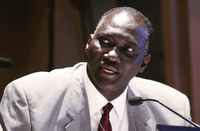 An expert in global water and environment issues, Diop currently heads the Ecosystems Section of UNEP's Division of Early Warning and Assessment in Nairobi, Kenya. He serves as the first chair of UNESCO's integrated coastal and marine cluster at the University of Cheikh Anta Diop in Dakar, Senegal.
An expert in global water and environment issues, Diop currently heads the Ecosystems Section of UNEP's Division of Early Warning and Assessment in Nairobi, Kenya. He serves as the first chair of UNESCO's integrated coastal and marine cluster at the University of Cheikh Anta Diop in Dakar, Senegal.
"Rapid urbanization in Africa has placed enormous pressure on the continent's urban water supplies," says Diop. "Urban slums, which account for about 60% of Africa's total urban population, pose a particular challenge."
"Municipal governments in Africa," he notes, "lack the skills and resources to build adequate water and sanitation infrastructures capable of serving their growing urban populations." In fact, even the most basic wastewater and solid disposal services are often unavailable. Untreated wastewater degrades the environment and often leads to the spread of water-borne diseases.
"Effective solutions to urban Africa's water challenges," Diop maintains, "can only take place by improving the water and sanitation infrastructure and by promoting integrated water and sanitation management."
Diop stresses that solutions must be devised at the local level through a participatory approach involving all stakeholders. "Community-based strategies," he says, "are essential."
He maintains that "soft engineering" – the application of ecological principles and practices (for example, wastewater treatment and basic recycling of solid waste) – is essential for addressing urban Africa's most acute water-related problems, especially in the city's most impoverished areas.
Diop says that "soft-engineering principles could be used to lower pollution levels in shallow wells, which the urban poor often rely on as the primary source of their water supply." Such principles can also serve as the basis of initiatives that use solid waste as a valuable energy source for small-scale, community-based biogas and electricity generation."
Although urban water challenges facing Africa today may seem overwhelming, Diop's work and experience suggest otherwise.
"Solutions to Africa's urban water problems are available," he says. "Improved drainage systems, more adequate sanitation facilities, and effective efforts to reuse and recycle both solid waste and wastewater can have a dramatic effect on the well-being of Africa's increasing number of urban residents."
For additional information about World Water Day, see www.worldwaterday.org.

